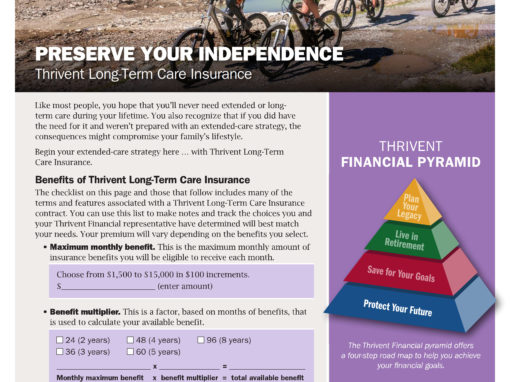Long Term Care Insurance Policy Brochures for Kentucky







Long Term Care Insurance Kentucky
Long-term care issues can be complex and confusing. With so many options, services and settings in which care is given, many people delay learning about the issues until they are personally affected. Unfortunately, that is likely to be the time when you are under the most pressure to make a decision, and when time is too short to carefully weigh your options.
Because these long-term care issues deserve your careful attention, don’t wait until it’s too late to find out all you can about this important health care alternative. Don’t wait any longer to find out important information!
What is Long-Term Care?
Long-term care is the day-in, day-out assistance you might need if an illness or disability lasts a long time and leaves you unable to care for yourself. This may or may not include a nursing home stay. In other words it is a continuum of services that can be provided in a variety of settings ranging from one’s own home, assisted living facility, adult day care facility or a nursing home. Long-term care covers a broad spectrum of care and services ranging from basic personal care to medical care.
Long Term Care Insurance Kentucky Shopping Tips
- Shop around for an insurance agent and an insurance company–ask friends, family or neighbors if they recommend their insurance agent or company.
- Ask insurance agents which insurance company’s products they sell; most agents only sell products from a few companies. Compare several different products from several different insurance companies. You might need to talk with several different agents.
- Carefully compare the benefits and restrictions between policies.
- Most LTC insurance premiums increase over time. Carefully evaluate whether premium payments over a long period could be a financial hardship.
- Never pay insurance premiums in cash; do not make checks payable to the insurance agent.
- Read your policy carefully and ask follow up questions.
- Use your 30-day “Free Look” period to return a policy for a full refund if you are not satisfied!
- Understand what a Long Term Care Partnership (LTCPP) policy is, how it differs from non-LTCPP policies, and whether it is affordable for you.
Frequently Asked Questions
What is the long term care insurance Kentucky partnership program?
The Long Term Care Insurance Kentucky Partnership Program is an agreement between state government and private insurance companies to assist consumers in planning for their long-term care (LTC) needs. The program was designed to increase awareness of issues related to long-term care, to create ways to reduce Medicaid costs for nursing home care, and to provide an incentive to consumers to purchase certain insurance policies in order to protect assets from Medicaid spend down requirements.
How does the program work?
The Department of Insurance, working with the Kentucky Department for Medicaid Services, developed the requirements for partnership insurance policies. State agencies also have been in close contact with federal officials in the development of this initiative. The asset protection (explained in more detail below) aspect of these policies is an important element as it relates to Medicaid eligibility and spend down requirements. Partnership policies may be sold after July 1. However, companies will need to finalize plans and get approval from the Department of Insurance prior to selling so consumers should not expect policies to be available immediately. Information on the availability of partnership policies will be included in future editions of the long-term care consumer guide published by the Department of Insurance. Contact your insurer for more detailed information on when the policies are available for purchase.
What are the requirements of a partnership policy?
The partnership policies must include inflation protection for certain age groups to assist with the increasing costs of long-term care. The benefits of the policy will automatically increase each year. Inflation protection is not required for individuals who are 76 years old or older but the benefit is available at an additional cost.
All LTC partnership policies must be “federally tax qualified,” which means the benefits you receive from the policy will not be considered taxable income. Contact your tax advisor for information on deductions or tax incentives.
If I’ve already purchased a long-term care policy, will my policy switch to a partnership policy?
Existing long-term care policies will not automatically qualify as a partnership policy. Contact your insurance company or agent for information on exchanging an existing policy.
If your policy qualifies, you will receive a notice from your insurer offering you the opportunity to exchange your policy for a long-term care partnership policy. Please pay close attention to the time period you are given to respond. You will have at least 90 days.
Your current health status and age will not be considered for the new policy with the same benefits. The company’s notice will include any premium change and a statement that you will not lose any rights, benefits or value. In addition, you will receive credit for satisfying pre-existing condition exclusion, elimination and incontestability periods.
Are partnership policies more expensive than non-partnership policies?
The premium for a partnership policy will be calculated the same way as any long-term care policy so the cost should be comparable to a non-partnership policy with similar benefits and inflation protection options.
Which insurers offer a partnership policy?
Every insurance company authorized to sell health insurance in Kentucky is authorized to offer partnership policies but the insurer must receive permission from the Department of Insurance prior to selling a policy.
Will insurance agents receive training on these new partnership policies?
Yes, companies are responsible for training agents before they will be allowed to sell partnership policies. The special training will include details on how the policies work with the Medicaid program.
Does having a partnership policy guarantee acceptance into Kentucky’s Medicaid program?
No. Eligibility for Medicaid can be very complicated and is reviewed on a case-by-case basis. However, if you purchase a LTC partnership policy and later apply and are declared eligible for Medicaid benefits, you can keep assets equal to the amount of benefits you have received through the insurance coverage. In addition, these assets would not be subject to estate recovery after your death, allowing you to leave a portion of your assets to your heirs.
Generally, an unmarried person would not qualify for Medicaid until he/she has assets of $2,000 or less. For example, if you have $100,000 in assets (stocks, bank accounts, etc.), Medicaid would require you to spend down $98,000 in assets before you would be eligible for benefits. However, if you have a long-term care partnership policy that has
paid out $50,000 in benefits, Medicaid would disregard $50,000 and you would be required to spend down $48,000 in assets before you would be eligible.
Keep in mind that asset protection (also known as asset disregard) is based on the amount the insurance company pays in benefits, not the value of the policy or the amount of premiums you have paid.
What if I move?
Kentucky has entered into a reciprocal agreement with most states offering partnership programs. If you buy a partnership policy in Kentucky and later move to a state with a partnership program and an agreement with the commonwealth, you may receive the same dollar-for-dollar asset protection benefit from that state’s Medicaid program. However, not all states participate in a reciprocal agreement so it is important to check before you move.
Sources:
Kentucky Department of Insurance
 This consumer guide contains information about long-term care options, long-term care insurance buying tips, worksheets, a glossary and sample rates.
This consumer guide contains information about long-term care options, long-term care insurance buying tips, worksheets, a glossary and sample rates.
The State of Kentucky recommends:
Searching for Rate Increase information in Kentucky? We have the answers you need.
For further assistance, please contact us.


